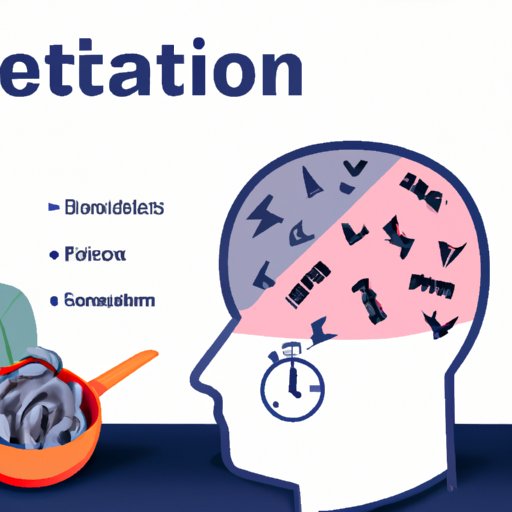
I. Introduction
For many years, mental disorders have been misunderstood, stigmatized, and often neglected. This article aims to define what mental disorders are, explore the causes and symptoms of different types of mental disorders and highlight the importance of seeking help and support. We also provide strategies for coping with mental disorders, prevention measures, and the role of social and policy measures in addressing mental health issues.
II. Defining Mental Disorder
Mental disorders are illnesses that affect a person’s thinking, behavior, and mood. These illnesses can be severe and long-lasting and can interfere with daily living. Several types of mental disorders exist, such as depression, anxiety disorders, schizophrenia, eating disorders, and substance abuse disorders.
The causes of mental disorders vary. Sometimes, genetic factors contribute to the development of these disorders. Other times, environmental stressors, such as childhood trauma, loss, or work-related stress, can trigger mental illnesses. Some common symptoms of mental disorders include persistent sadness, irritability, fatigue, difficulty sleeping, hallucinations, delusions, and suicidal thoughts.
III. Understanding Mental Illness
Mental illness is a prevalent issue that affects millions of people worldwide. In fact, according to the World Health Organization, one in four people globally will struggle with a mental illness at some point in their lives.
It is essential to differentiate between normal behavior and symptoms of mental disorders. It is normal to feel down and stressed at times. However, if these feelings persist, interfere with daily living, and affect your quality of life, it is time to seek help.
Neglecting our mental health can have grave consequences. Mental disorders can lead to substance abuse, social isolation, and even suicide. Consequently, it is crucial to seek help and support when you or a loved one shows signs of mental distress.
IV. Breaking the Stigma
The social and cultural stigma surrounding mental disorders often makes it challenging for individuals to seek help. This stigma is often driven by myths and misconceptions about mental health. However, it is essential to acknowledge that mental illnesses are as real as physical illnesses, and seeking help does not make you weak.
Personal stories of people who have overcome their mental disorders can be inspiring and give hope to those still struggling. With the right treatment, medication, and support, individuals with mental disorders can live a fulfilling life.
It is essential to seek help and support when dealing with mental disorders. Psychologists, psychiatrists, and other mental health professionals offer various treatment options, such as cognitive-behavioral therapy, medication, and support groups. Family and friends can also play a crucial role in providing emotional support.
V. Coping with Mental Disorders
People living with mental disorders can adopt various strategies to cope and manage their conditions. Some strategies include adopting healthy lifestyles, such as exercising regularly, eating a healthy diet, and getting enough sleep. Individuals can also engage in activities they enjoy, such as hobbies, to boost their mood and reduce stress.
Preventive measures such as avoiding drug and substance abuse, managing stress and anger, and building healthy relationships are essential in preventing mental disorders.
Treatment for mental illnesses often involves a combination of medication and psychotherapy. Psychotherapy such as talk therapy is a technique commonly used to help individuals identify and manage triggers that lead to symptoms such as anxiety or depression. Lastly, social support from loved ones, such as family, friends, or support groups, can be invaluable in coping and managing mental illnesses.
VI. Mental Health and Society
Mental disorders have far-reaching social, economic, and political implications. Individuals with mental illness often struggle to access health care, housing, and employment. This struggle can lead to economic losses for both the individuals and the society at large.
Social and policy measures targeting mental health care can alleviate the burdens faced by people living with mental illnesses. These measures may include funding for mental health research, better access to mental health care, and social support for individuals living with mental disorders.
VII. Proposing a Paradigm Shift
The prevailing mental health care system often focuses on treating mental illnesses after they have already occurred. A better approach would be to prioritize the prevention of mental disorders. This paradigm shift would require a multilevel approach that involves promoting healthy lifestyles, investing in mental health research, and integrating mental health care into primary health care.
To achieve this paradigm shift, policy changes, investment in mental health, and public education campaigns are critical. Individuals can also prioritize their mental health by adopting healthy lifestyles, seeking support when they need it, and promoting mental health in their communities.
VIII. Conclusion
Mental disorders can be debilitating, and neglecting our mental health can have serious consequences. In this article, we have defined mental disorders, explored the causes and symptoms of different types of mental disorders, and provided strategies for coping with mental illnesses. It is essential to recognize the social and cultural stigma surrounding mental health and seek help and support when we need it. Lastly, we have proposed a paradigm shift that prioritizes the prevention of mental disorders. By adopting healthy lifestyles, seeking help when needed, and advocating for public policy changes, we can prioritize mental health and live fulfilling lives.




